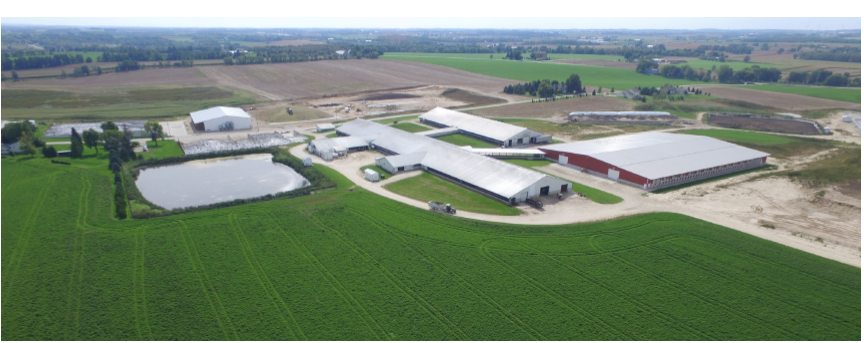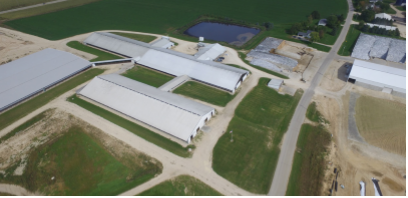Established in 1847, Sunset Farms in Allenton, Wisconsin, is a sixth-generation family farm dedicated to supplying customers with safe, high-quality milk and providing compassionate care for animals and the land they depend on.

The Wolf family at Sunset Farms recognized a need to expand their milking operations at the farm. In 2013, they began a partnership with MSA to lead the design and development of an expansion plan to grow from 900 milking cows to 3,500 milking cows.
The proposed expansion encompassed approximately 45 acres and was to be completed in two phases. Phase I was constructed in 2015 and included a new 744-stall freestall barn, new 27.9-million-gallon concrete-lined manure storage tank, upgraded manure transfer system, new commodities building, feed pad to accommodate a drive-over feed pile, improved leachate and runoff collection system and vegetative treatment area. Phase II called for an expansion of the new freestall barn to add 244 more stalls, the addition of a second freestall barn of 1,250 stalls, associated milking parlor, and extensions to the manure transfer system, feed pad and vegetative treatment area.
Sunset Farms was growing at a rapid pace and they needed the guidance of an experienced agricultural engineering and consulting team to ensure plans for growth would both be successful and would continue to uphold their high standards of quality and care.

The farm’s manure management system required extra attention, as it needed to incorporate both the existing and new manure transfer flush and storage units. MSA engineers designed a new reuse water system that would utilize water from a manure lagoon to flush out the barns’ flumes.
Another area of importance involved the farm’s leachate collection and vegetative treatment system. In order to maintain the farm’s compliance of zero discharge for their WPDES permit, the existing system needed to be combined with the proposed collection and treatment system. This was accomplished with a combination pumped and gravity flow system of underground storage tanks and piping that ultimately discharge in a uniform flow to a vegetative treatment area.
Phase I of this project was completed in the fall of 2015, and Phase II remains postponed due to the economic stress of the industry. All new systems have been designed and constructed in accordance with Natural Resource Conservation Service (NRCS) conservation practice standards, NRCS Wisconsin construction specifications, Wisconsin DNR Chapters NR 151 and NR 243 and local regulation.
